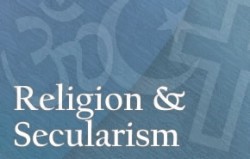Constitutional Analysis
Of 'State religion' and 'secularism'
S. M. Masum Billah
 Much ink has been exhausted so far after the 15th Amendment is passed. Most provisions of the said amendment are being flogged mercilessly by the writers/columnists/politicians and the people at large on diverse grounds. In my write up, from purely an academic look, I desire to concentrate on the alleged contradiction between the retention of 'state religion' and principle of 'secularism' simultaneously. The most contentious issue, it appears, is the state religion provision and the secularism principle. Before I go, let me quote the relevant provision as it stands now after 15th Amendment: “ 2A. The State religion.--The state religion of the Republic is Islam, but the State shall ensure equal status and equal right in the practice of the Hindu, Buddhist, Christian and other religion.”
Much ink has been exhausted so far after the 15th Amendment is passed. Most provisions of the said amendment are being flogged mercilessly by the writers/columnists/politicians and the people at large on diverse grounds. In my write up, from purely an academic look, I desire to concentrate on the alleged contradiction between the retention of 'state religion' and principle of 'secularism' simultaneously. The most contentious issue, it appears, is the state religion provision and the secularism principle. Before I go, let me quote the relevant provision as it stands now after 15th Amendment: “ 2A. The State religion.--The state religion of the Republic is Islam, but the State shall ensure equal status and equal right in the practice of the Hindu, Buddhist, Christian and other religion.”
The word 'equal status and equal rights' deserves attention. Can the word 'equal status' be not read as equivalent of 'state religion' used the marginal note? If the answer is a 'NO', let me remind you the earlier provision of the constitution on the point: “The state religion of the Republic is Islam, but other religions may be practiced in peace and harmony in the Republic.” Can we now regard the present provision a definite development towards religious equality and secularity? The mentioning of religions by name and conceding state's obligation to elevate the same status [as that of the state religion] better serves the connotation I am trying to fabricate to the word 'secularism. The contextual interpretation of constitution suggests that 'state religion' in Bangladesh is not to be taken “as state's religion” . Nor should it be taken to mean that 'the state albeit an abstract entity has retained a religion'. Rather it is designed to signify that being majority people's religion, Islam commands separate mentioning. If the mass people are secular in thinking and practice (indeed so the Bangladeshi people), such mentioning does not snatch away the secular polity of the constitution. To convince my readers I beg to remind that 'Bangla' has been mentioned as our state language in Article 3, which certainly is not in the sense to suppress other community's language prevailing in Bangladesh ( study reveals that there are almost 40 languages in the country).
The preamble states in the following fashion: “Pledging that the high ideals of nationalism, socialism, democracy and secularism, which inspired our heroic people to dedicate themselves to, and our brave martyrs to sacrifice their lives in, the liberation struggle, shall be the fundamental principles of the constitution.” A careful reading of this preambular pledge unfolds that Article 2A (State religion) is excluded from being the 'fundamental principles of this constitution.' It seems that these great words used in the preamble gain somber meaning when we are gripped by a grim crisis because 'secularism' as a cornerstone of the constitution is confused and bigoted both by the right and left body politic. A constitution is to be understood and interpreted in the lofty ideals of the preamble as preamble is said to be the 'guiding star' ( Per M. H. Rahman J. in 8th Amendment Case) and touchstone of the constitution. The opening five words 'We, the People of Bangladesh' are revolutionary in the sense that it has recognized the people's sovereignty on power in a locomotive manner. Indeed, these social-contract reflective words should be the entire fabric of the secular character of the constitution. The jurisprudence of secularism in its magnificent panorama should also embrace the nationalistic ethos and economic synthesis for an exploitation free society. (New Article 9 and 10)
 It seems that mere presence of the concept of 'state religion' in Article 2A does not become a hindrance for secularism on another ground. Article 12 where the content of secularism has been explained in the freedom of religion context, ordains the state to ensure secularism by eliminating communalism, not according political status to a religion, not abusing religion for political purpose, by practicing non-discrimination and non-persecution on religious grounds. Article 12 squarely falls within the part of Fundamental Principles of State Policy (Part II). A constitutional lawyer knows the significance of Fundamental Principles of State Policy (FPSP). It has been enshrined in Article 8 that FPSP (with the essence of nationalism, socialism, democracy and secularism) shall be i) fundamental to the governance of Bangladesh, ii) applied by the State in the making of laws iii) a guide to the interpretation of the Constitution and of the other laws of Bangladesh, and iv) form the basis of the work of the State and of its citizens. So the entire rubric of constitutional canvas should be taken in the light of these philosophical postulates. A harmonious construction of Article 6. 8, 9, 10 and 12, therefore, discards any contradiction between the concept of 'state religion as used' and the concept of 'secularism' as envisaged. The secular think tank of Bangladesh has always argued that 'secularism' in Bangladesh does not mean 'dhormoheenota'. Contrast between Article 2A and 12 is only possible when secularism is taken in this 'dhormoheenota' sense. Otherwise, a harmonious interpretation is very much within the constitutional contemplation. Some people say that FPSPs are 'not judicially enforceable'. This interpretation is obsolete now and constitutional and human rights jurisprudence has taken a new strategic approach to enforce the FPSPs in the form of socio-economic rights. With the mellowness of 'universality, inalienability, indivisibility' of human rights concept, the non-justiciability of state principles does not sustain at all. Bangladeshi secularism, without borrowing from western rationalism or Marxian materialism must go to its roots of comity and peaceful co-existence of the religions.
It seems that mere presence of the concept of 'state religion' in Article 2A does not become a hindrance for secularism on another ground. Article 12 where the content of secularism has been explained in the freedom of religion context, ordains the state to ensure secularism by eliminating communalism, not according political status to a religion, not abusing religion for political purpose, by practicing non-discrimination and non-persecution on religious grounds. Article 12 squarely falls within the part of Fundamental Principles of State Policy (Part II). A constitutional lawyer knows the significance of Fundamental Principles of State Policy (FPSP). It has been enshrined in Article 8 that FPSP (with the essence of nationalism, socialism, democracy and secularism) shall be i) fundamental to the governance of Bangladesh, ii) applied by the State in the making of laws iii) a guide to the interpretation of the Constitution and of the other laws of Bangladesh, and iv) form the basis of the work of the State and of its citizens. So the entire rubric of constitutional canvas should be taken in the light of these philosophical postulates. A harmonious construction of Article 6. 8, 9, 10 and 12, therefore, discards any contradiction between the concept of 'state religion as used' and the concept of 'secularism' as envisaged. The secular think tank of Bangladesh has always argued that 'secularism' in Bangladesh does not mean 'dhormoheenota'. Contrast between Article 2A and 12 is only possible when secularism is taken in this 'dhormoheenota' sense. Otherwise, a harmonious interpretation is very much within the constitutional contemplation. Some people say that FPSPs are 'not judicially enforceable'. This interpretation is obsolete now and constitutional and human rights jurisprudence has taken a new strategic approach to enforce the FPSPs in the form of socio-economic rights. With the mellowness of 'universality, inalienability, indivisibility' of human rights concept, the non-justiciability of state principles does not sustain at all. Bangladeshi secularism, without borrowing from western rationalism or Marxian materialism must go to its roots of comity and peaceful co-existence of the religions.
The opening with the Islaimic words 'bimillah-ar-rahman-ar rahim' is now suffixed with its Bangla translation and an addition of a purely common connotation like 'Creator' and 'Merciful'. This 'commonality' also gives the fuller meaning of secularism concept as the constitution in the present format is presumably trying to strive. Above more, a constitutional law student understands that the opening paragraph of the constitution starts with 'We, the people of Bangladesh' connoting paramount prominence of people's sovereignty and secularity of our democratic polity.
Principle of secularism has forbidden the state to allow any body to use religion for achieving political ends. The provisions gives the full freedom of exercising one's own religion and refrain people to exploit religion for vindicating personal gain. To my understanding retention of secularism and state religion in a passionate form has glorified our constitution a great deal. The more and speedy we would understand it, the more welfare we would get from it. Under the present form on the point, when Bangladesh would be said to be a secular state it would mean that we do not reject the reality of an unseen spirit or the relevance of religion in life. It would not mean that we exalt irreligion. It would not mean that secularism itself would become a positive religion or the state assumes divine prerogatives. We would hold religious impartiality or comprehension or forbearance. And it is recognized that religion has a prophetic role to play within the national and international life. This is how the present provisos need to be understood and interpreted.
In religions there are wide options, in traditions there are ample flexibility. Each generation can choose for emphasis the elements that appeal to it most. Religion thus becomes a reservoir, a source of strength for social cohesion and change. It is really tough to reject by a reformer the role of religion in making our polity because of some 'assumed theology' of secularism. To try to put our understanding of secularism into the western zeal would unreal escapism or impulsive rashness. Truth of religions should not be made irreconcilable with social and humanitarian ethos of our times. Nor would it be irreconcilable with reason. It should represent a pattern of institutional framework for a true synthesis of reason and compassion, spirit of tolerance and freedom of faiths. Before I conclude I wish to quote from Atheist Society of India v. Govt. of A.P. an Indian Supreme Court case of 1992 wherein J E Prasad, J. held in his obiter dicta: " Secularism is at once an ideal and an inspiration, a goal as well as a striving, a product as well as a process. It is made of aggregation rather than segregation, of synthesis rather than separation, of pluralism rather than dominance".
The writer is Assistant Professor of Law, Jagannath University, Dhaka.